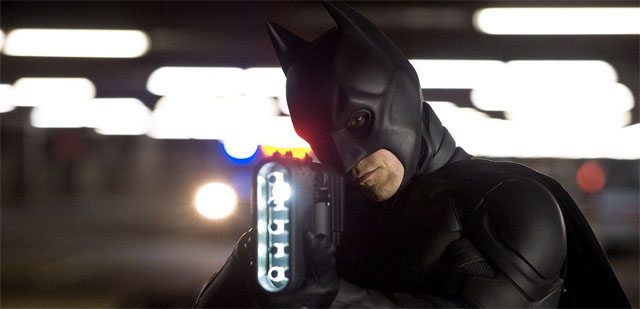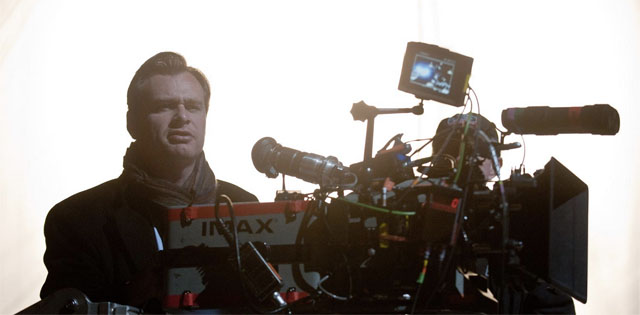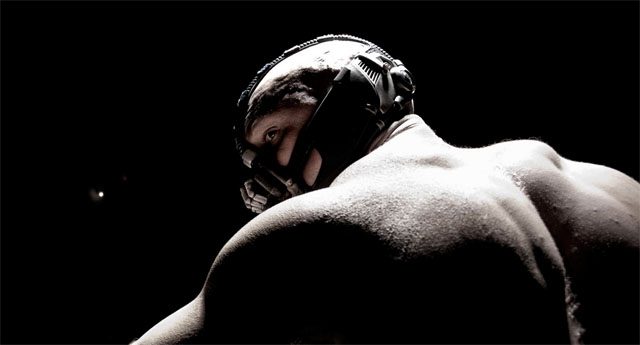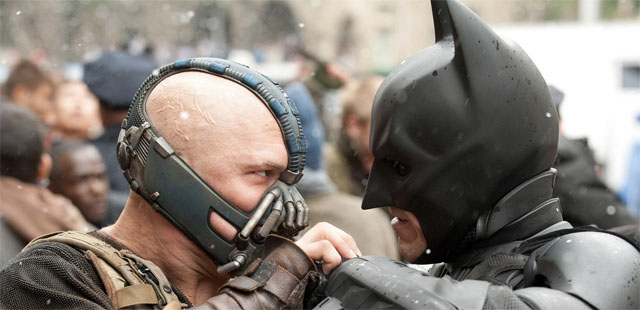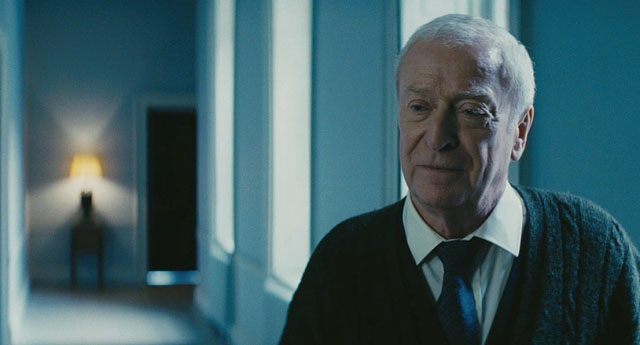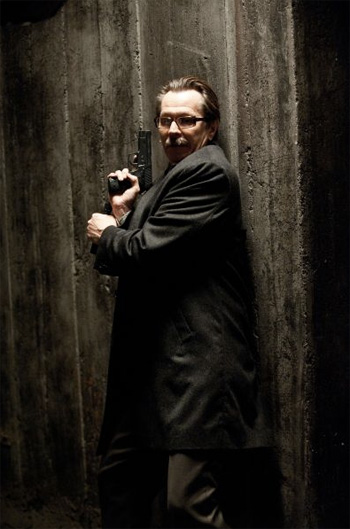Now that the dam has broken, here come the flash floods, so let’s get right to it: “The real world threats of terrorism, political anarchy and economic instability make deep incursions into the cinematic comic book domain in The Dark Knight Rises,” begins Todd McCarthy in the Hollywood Reporter. “Big-time Hollywood filmmaking at its most massively accomplished, this last installment of Christopher Nolan’s Batman trilogy makes everything in the rival Marvel universe look thoroughly silly and childish. Entirely enveloping and at times unnerving in a relevant way one would never have imagined, as a cohesive whole this ranks as the best of Nolan’s trio, even if it lacks—how could it not?—an element as unique as Heath Ledger’s immortal turn in The Dark Knight. It’s a blockbuster by any standard.”
“If viewers were wanting a corrective to the jumpsuit antics of The Avengers, or the noodling high-school angst of The Amazing Spider-Man, then rest assured that Batman delivers in spades,” writes the Guardian‘s Xan Brooks. “Here is a film of granite, monolithic intensity; a superhero romp so serious that it borders on the comical, like a children’s fancy-dress party scripted by Victor Hugo and scored by Wagner…. ‘I’m still a believer in the Batman,’ murmurs Joseph Gordon-Levitt’s rookie cop at one point. Arm-twisted, senses reeling, I am forced to concede that I am too.”
“Running an exhilarating, exhausting 164 minutes, Nolan’s trilogy-capping epic sends Batman to a literal pit of despair, restoring him to the core of a legend that questions, and powerfully affirms, the need for heroism in a fallen world,” writes Variety‘s Justin Chang. “If it never quite matches the brilliance of 2008’s The Dark Knight, this hugely ambitious action-drama nonetheless retains the moral urgency and serious-minded pulp instincts that have made the Warners franchise a beacon of integrity in an increasingly comicbook-driven Hollywood universe.”
“Eight years after the events of The Dark Knight, Bruce Wayne (Christian Bale) has become a recluse, limping around his estate because of injuries sustained as Batman, while the public speculates about his sanity.” Todd Gilchrist for the Playlist: “But when a masked, monolithic terrorist named Bane (Tom Hardy) empties the Wayne coffers and launches a populist uprising using an underworld of thieves and criminals, Bruce is forced to don the cape and cowl again to try and restore order… Looking piecemeal at The Dark Knight Rises, it feels like a movie of profound disillusionment about America that could only be objectively told by someone who’s not a native: Nolan dissects our current financial woes, our clash of cultures, even one-percent-versus-99-percent-style class warfare with a scalpel, assigning culpability to all involved and condemning the whole system as a sort of demagogue-exchange program. From the corporate fat cats to the mouth breathers scraping by on pennies, everyone aspires to change their situation, to triumph over the forces of (sometimes rightful) opposition, or to wipe the slate clean and start again, and their motives are almost unilaterally unclean – either in origin or execution. The film should have its own Faustian bargain counter in the corner of the screen, ticking off bad decisions and foolhardy expectations.”
“Anne Hathaway’s interpretation of Selina Kyle, known best as Catwoman to most fans, is indelible, a strong and savvy match for Bruce Wayne,” writes Drew McWeeney at HitFix. “Nolan uses her as one part of the thesis of the movie, with Bane, the strange terrorist played by Tom Hardy, as the blunt instrument that drives the point home. Bane’s plan to bring Gotham to its knees is elaborate and, once revealed, somewhat horrifying. He is not simply a rehash of the Joker, who was more of a force of chaos than anything. Bane is evil. He is unrelenting, unquestioning, destructive evil…. Whoever Warner Bros hires to reboot the Batman films a few years from now, I wish you luck. The bar is as high as it could possibly be.”
Chris Clow visits the set for Movies.com.
Empire has Hans Zimmer’s complete soundtrack.
With the Dark Knight, Imax rises as well, reports Mekado Murphy in the New York Times.
The Film Doctor‘s rounded up a batch of links to essays, trailers, and more, all related to the Dark Knight.
Updates: The Dark Knight Rises is “a show, all right,” declares Time‘s Richard Corliss. “But not in the way of the standard summer action fantasy. Although his movie contains elaborate fights, stunts, chases and war toys, and though the director dresses half his characters in outfits suitable for a Comic-Con revel, Nolan is a dead-serious artist with a world view many shades darker than the knight of the title…. For once a melodrama with pulp origins convinces viewers that it can be the modern equivalent to Greek myths or a Jonathan Swift satire. TDKR is that big, that bitter—a film of grand ambitions and epic achievement. The most eagerly anticipated movie of summer 2012 was worth waiting for.”
“I’m not foolhardy enough to compare Nolan to the David Lean of The Bridge on the River Kwai or the Francis Ford Coppola of Apocalypse Now,” writes Glenn Kenny for MSN Movies, “but it’s pretty clear that the cinematic canvas Nolan aspires to fill is pretty much that size. I don’t wanna damn with faint praise by saying something like ‘he doesn’t disgrace himself in trying to fulfill that ambition.’ It’s honestly too soon to tell just how The Dark Knight Rises will fit into the epic movie canon. But it’s a very, very good large-scale action/crime movie with a degree in high technology and a will to make you believe in costumed crime fighters.”
“I spotted riffs on sequences from Lang‘s Metropolis and Eisenstein‘s October and there are extensive borrowings from Dickens’ A Tale of Two Cities in the film’s second and third act,” writes the Telegraph‘s Robbie Collin. “The scope here is unashamedly novelistic, and although the plotting of the film’s first act is arguably muddled, Nolan’s sheer formal audacity means the stakes feel skin-pricklingly high at all times: if he is prepared to go this far, I found myself often wondering, just how far is he prepared to go? Well, the answer is further than any other superhero film I can think of: after a breathless, bravura final act, a nuclear payload of catharsis brings The Dark Knight Rises, and Nolan’s trilogy, to a ferociously satisfying close.”
“[W]ith its rampaging Occupy Gotham anarchists, philanthropic billionaires and decent cops who ignore due process, this is so staunchly right-wing it’ll thrill all those Fox News anchors outraged by The Muppets,” predicts Time Out London‘s Tom Huddleston. “But when the Bat flies, such considerations go out the window. Sublimating CGI in favor of real crowd scenes and massive cityscapes, Nolan creates a grand, dirty, engrossing world, and his action sequences just hum.”
“For the first time, the 3rd act is the best act in the film. Some may feel that this is because there is some form of ‘conclusion,’ a word you should not try to parse before seeing the film.” But for David Poland, the real reason is “that Nolan finally allowed himself to make the movie he’s been after twice before.”
But for Tim Grierson, writing at Screen, this is “the first of the series not to smoothly execute its grand aspirations. The film suffers a bit from a glut of new characters… but is helped along by Nolan’s continued insistence on emotional resonance over mindless spectacle. If there’s a slight sense of disappointment that this sequel can’t match the heights of the first two films, there’s no shame in a major studio tentpole daring to let its reach exceed its grasp.”
“With a grisly twist that puts Batman out of commission for large portions of the movie, The Dark Knight Rises hardly qualifies as a superhero movie by the usual standards, which may have been Nolan’s intention from the start,” writes Eric Kohn at indieWIRE.
“The Dark Knight was a roller coaster that sped to an action climax every 20 minutes,” recalls Amy Nicholson at Box Office. “Often, it’d even impatiently cross-cut between two nail-biters…. The audience was tricked and misled as often as were Gotham’s finest. But here, the showdown between Bane and Batman looms large, and everything in the film marches towards it. There are no fake-outs, no games, not even a 50/50 Harvey Dent coin flip. It’s grand-scale drama, a mandated epic, but one lacking the churning tension that powered The Dark Knight. Though Rises never even once mentions the Joker’s name, his absence is felt on every frame.”
“[T]hese films are genre films,” James Rocchi reminds us at Movies.com, “and thus much improved (or, more firmly, made) by a good bad guy. The Dark Knight had two of them, Ledger and Aaron Eckhart, helping that film play out as a shadowy cover version of The Man who Shot Liberty Valance by way of Heat, a story about the rule of force and the rule of law and their mutual enemy, chaos. Tom Hardy has brawny shoulders and a broader brogue as Bane, a mask-wearing mercenary who commits himself to both destroying Batman and Gotham alike; it’s nothing like, or as good, as Ledger’s capering showman-terrorist. And Aaron Eckhart’s reform-to-revenge American schizo Harvey ‘Two-Face’ Dent was far more interesting than this film’s new player, Anne Hathaway’s silky, skillful cat burglar Selina Kyle. Hathaway is game as glammy grifter Kyle, but the character lacks the grimly ironic arc of Eckhart’s Dent; these stories often work best as clumsy tragedies, Macbeth in oven mitts, and Ledger and Eckhart’s work made for exactly that. The Dark Knight Rises is less thematically interesting, less structurally compact and less energetically propelled than The Dark Knight, a comparison that is less a slight than a simple statement of fact.”
Marshall Fine has evidently become the first critic to post a negative review, nabbing the spotlight (and hit count) from Armond White, whether or not that was his intention, and ticking off legions of fanboys, as Eric Randall reports for the Atlantic Wire: “Fine now faces the extreme wrath of the film’s defenders, almost all of whom, we presume, haven’t seen the movie, which doesn’t premiere until this weekend. There are, as of this writing, 550 comments on the Rotten Tomatoes post about his review. Many of them are enraged. This has prompted Rotten Tomatoes to tweet a reminder that ‘Comments that violate our TOS (i.e. threats) will get you banned from the site.’ (Deleted comments so far include ‘die in a fire.’ Charming.)”
Updates, 7/18: “Christopher Nolan has completed his postmodern, post-Sept. 11 epic of ambivalent good versus multidimensional evil with a burst of light,” argues Manohla Dargis in the New York Times. “After repeatedly sending Batman down Gotham’s mean streets, Mr. Nolan ends by taking him somewhere new…. His playfulness with the scenes-within-scenes in his last movie, Inception, has paid off here. The action interludes are more visually coherent than in his previous Batman films and, as in Inception, the controlled fragmentation works on a pleasurable, purely cinematic level. But it also serves Mr. Nolan’s larger meaning in The Dark Knight Rises and becomes his final say on superheroes and their uses because, as Gotham rages and all seems lost, the action shifts from a lone figure to a group, and hope springs not from one but many.”
In Slant, Nick Schager argues that, “like its predecessor, The Dark Knight Rises proves a politically conservative animal, one in which Bane and his minions seek to upset socio-economic paradigms through culture war, and Batman and his army of police officers, given dignified treatment by Nolan in a near-silent pan across their ranks right before their clash with Bane’s ‘revolutionaries,’ aim to uphold the established rich-on-top order. However, as befitting a script that’s overstuffed with narrative strands, from the push-pull between anti-Batman Deputy Commission Foley (Matthew Modine), Commissioner Gordon (Gary Oldman), and upstart officer John Blake (Joseph Gordon-Levitt), to Wayne’s frayed relationship with Alfred and interactions with Lucius Fox (Morgan Freeman) and potential love interest Miranda Tate (Marion Cotillard), the film muddles its political viewpoints, or at least compromises them in the spirit of not pressing any hot buttons too hard. As a result, Batman’s opposition to Bane also puts him on the side of the very working-class people Bane purports to champion.”
“If The Dark Knight openly invited interpretation as the War on Terror Batman,” writes Nick Pinkerton in the Voice, “then The Dark Knight Rises, whose creators obviously scented the class discontent in the air, is the Occupy Wall Street installment.”
At the Atlantic Wire, Richard Lawson argues that OWS “is portrayed as merely a scary seethe of anarchistic, anti-establishment rage. The film doesn’t paint financial fat cats terribly well either, but they are at least not depicted as violent, city-destroying monsters. In Nolan’s defense, by picture’s end it does seem that his ultimate intent was to make an equivocating plea for a middle ground—don’t blindly distrust government and industry, but don’t trust it too much either—but that wishy-washiness does wind up dismayingly feeding right into the frustratingly muddled, almost sophomoric ideology that lies squishily at the heart of the entire series.”
“True to the director of Memento and The Prestige, Nolan lays down twist after twist as the trilogy draws to a close,” writes Scott Tobias at the AV Club, “but the true greatness of The Dark Knight Rises is how beautifully it’s integrated with the other two movies. Handling that mythology—to say nothing of the heavy freight of fanboy expectation—is superheroic in its own right, but the miracle of Nolan’s Batman trilogy is the way it imprints those myths with the dread-soaked tenor of the times. There’s a catchall quality to the politics of it—the Occupy movement could be viewed here as unifying force or order-upending menace—but Nolan seems content to let his popular entertainment double as a Rorschach test. At a time when Hollywood seems incapable of doing anything that isn’t a grand-scale fantasy, Nolan has hijacked the form to bring it down to earth.”
“The Dark Knight Rises shows the blockbuster auteur still capable of appealing visual bombast where other summer fantasies just scan as busy,” writes Nicolas Rapold in the L. “Yet his handle on storytelling is tenuous… Where the terrorizing of the previous installment had a sense of gamesmanship and Heath Ledger’s nerve, Nolan (co-writing with his brother) feels like a panderer here, turning a trading floor into target practice and unleashing pillagers on ‘Fifth Avenue.'”
“[M]asterful filmmaking by any standard,” counters the Los Angeles Times‘ Kenneth Turan.
“You’ll believe a man can shoot in and finish on celluloid,” writes Ray Pride at Newcity Film. “So many practical locations, massing of people and machinery, flying and falling, the rushing of water, the creasing and uncreasing of sly smiles, all on film…. Even the visual-effects-heavy scenes are a real world away from a digital superhero movie.”
“It’s proudly 2D,” adds J. Hoberman at Artinfo, “if only half interesting, and, although tiresome in its stridence and strangulated by its own grandeur, not without a certain integrity. Nolan is a terrific editor but, as with his much maligned Inception, he withholds the bang-bang montage that is his signature special effect until what used to be called the final reel.”
“As a graphic novel enlarges the scope and seriousness of a mere comic book, so a Christopher Nolan film should exalt the summer superhero movie,” writes Jonathan Kiefer in Faster Times. “And with the likes of The Avengers and The Amazing Spider-Man getting so cheeky, so loopy, this Batman must once and for all reassert his sprawling ponderous solemnity. The real pleasure is in Nolan’s dedication to his investment.”
For Time Out New York‘s David Fear, “grand scale or no, this feels like a blockbuster on autopilot more often than not, curiously detached and self-importantly somber even by the director’s standards—and without the cerebral heft of his best work.”
Jim Emerson, who’s been hosting a discussion of the “moral dimensions of superhero movies,” and has been a lucid critic of Nolan’s direction of action sequences, prepares for Rises.
“And in today’s edition of Stuff I Wouldn’t Dare Make Up,” blogs Joe Leydon, “Rush Limbaugh makes the Bain/Bane connection—and is predictably (so very, very predictably) outraged.”
Meantime, Sean O’Neal at the AV Club: “Seemingly suggesting that the anonymity of Internet commenting tends to bring out the worst in people and that fans of Christopher Nolan’s Batman films are particularly sensitive to slights, Rotten Tomatoes has suspended all user comments—for the first time in its history—on reviews of The Dark Knight Rises, after a mere few hundred minor personal attacks and fanciful violent fantasies against those critics who have dared to find fault with the film.” Among those reviews inciting the fanboys to death threats and such is Christy Lemire‘s, who argues that “the feeling of frustration and disappointment is unshakable.”
Updates, 7/19: Writing for the New Inquiry, Elliott Prasse-Freeman and Sayres Rudy argue that Rises “already stands as one of the first mass-culture artifacts of the Occupy era. Its trailers alone have inadvertently revealed the violence necessary to maintain social inequality, and whether billionaire Batman saves the day in the film is irrelevant. The trailers have exposed him as the true villain of our current impasse. Batman is too big to fail.”
“Profound disappointment.” Ain’t It Cool‘s Harry Knowles calls “bullshit” on Rises about 16 times.
The Film Society of Lincoln Center’s Scott Foundas disagrees: “In their look and feel, [Nolan’s] Batman films have all harked back to an earlier, less attention-deficient cinematic era, the exotic foreign vistas and gang-infested city streets of Batman Begins alternately calling to mind David Lean and the Warner Brothers crime dramas of the 40’s and 50’s, The Dark Knight invoking The Naked City and The French Connection in its sense of Gotham as urban jungle. In The Dark Knight Rises, Nolan pulls off an even more impressive feat—a long, elaborate set piece consuming nearly the entire second half of this three-hour movie, that begins with a child singing ‘The Star-Spangled Banner,’ ends with a bomb literally bursting in air and, in between, stirs and moves us in ways movies (superhero or otherwise) rarely do. It is, I think, one of the great sustained pieces of action in American movies—a sequence that, in its juxtapositions of sound and image, beauty and horror, calls to mind the baptism/massacre from the end of The Godfather, the wedding party in The Deer Hunter, and a handful of other scenes in other movies that have found, in a single scenario, a vivid metaphor for all that is great and terrible, noble and selfish, tainted and hopeful about we the people.”
Bilge Ebiri, writing for the Nashville Scene, is reminded of Martin Scorsese’s Gangs of New York, “which also showed the strain of its ever-expanding canvas. That film too was a gloriously expansive cartoon, an attempt to use simple, even simplistic characters and situations to forge a big, bold vision of a nation being born. But that nation wasn’t a real country; Gangs was a retroactive creation myth for the ‘America’ of Sergio Leone Westerns and Bob Kane comic books. In that sense, Nolan’s sprawling bleak fantasy isn’t just a final curtain, but also a kind of homecoming. Ambitious, riveting and silly in equal measure, The Dark Knight Rises is a resolutely ‘shallow’ epic—problematic, perhaps, but also a work of unforgettable, compulsive beauty.”
Salon‘s Andrew O’Hehir: “I’m tempted to argue that the real story of Nolan’s Dark Knight trilogy is the story of its own creation, a dark, personal, auteurist spectacle on a scale never before possible and never before attempted, and an enormously successful mass-market entertainment to boot. If the central theme of these movies is the triumph of the will (to coin a phrase), then that triumph is not Batman’s or Bruce Wayne’s but that of solitary and devious superhero/supervillain Chris Nolan, as he imposes his bizarre obsessions on the entire world.”
“Rises might be the biggest movie I have ever seen,” writes Sean Burns in the Philadelphia Weekly. “Not the best, mind you—just the largest, most sprawling, and most comically ambitious.”
“Rises bursts at the seams with the kind of urgent, vague political references that fall just short of being ideas,” writes Slate‘s Dana Stevens. “We are witness to secret black-ops prisons, Kafkaesque kangaroo courts, and a terrorist incident at a crowded football stadium that’s staged with the visual imagination Nolan is justly famed for. It’s clear the director and his brother Jonathan (a frequent collaborator with whom he co-wrote the screenplay) want us not just to enjoy the ambient mayhem, but to think about… stuff. Violence, justice, revenge, the human condition, and whatnot. Exactly what conclusions we should be drawing from this 164-minute cogitation on social issues is never clear, but maybe that’s of a piece with the moral ambiguity of Bale’s Batman, who’s always split the difference between idealist hero and nihilist vigilante.”
“What’s really interesting about Nolan’s capstone to the series is its obvious nod to the duplicity, or derangement, of populist politicians whose promises of less government and more freedom lead, ultimately, to mob rule and the unleashing of an utterly nihilistic brand of self-devouring anarchy.” For the Austin Chronicle‘s Marc Savlov, Rises is “something of a warped mirror image of the equally dark but ultimately more hopeful adaptation of Alan Moore’s V for Vendetta.”
Adam Woodward at Little White Lies: “Just as Frank Miller’s graphic novel template offered a response to the capitalist he

